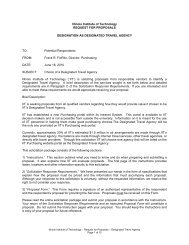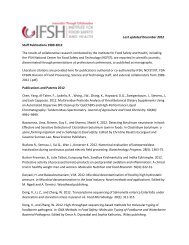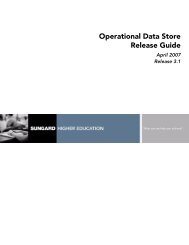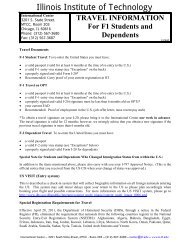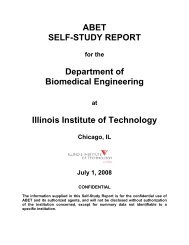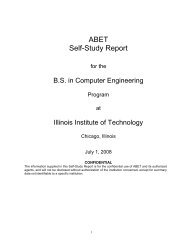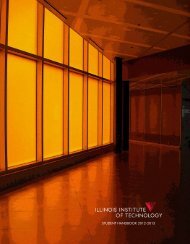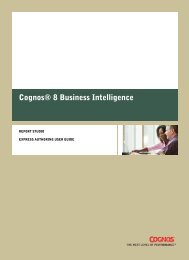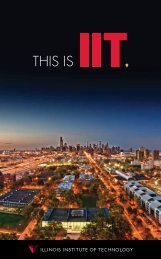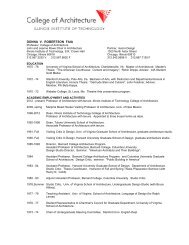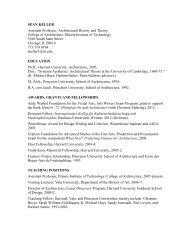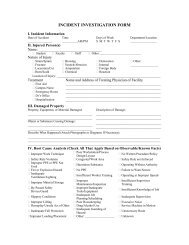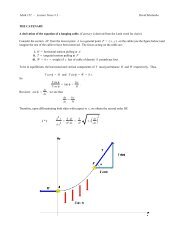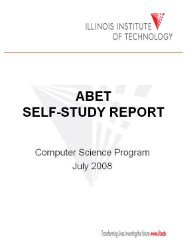Copyright & Disclaimer Information - Illinois Institute of Technology
Copyright & Disclaimer Information - Illinois Institute of Technology
Copyright & Disclaimer Information - Illinois Institute of Technology
You also want an ePaper? Increase the reach of your titles
YUMPU automatically turns print PDFs into web optimized ePapers that Google loves.
public problems and how the government<br />
develops public policies and with<br />
what effect. Emphasizes the characteristics<br />
<strong>of</strong> the American policy-making<br />
process. Case studies are used to<br />
clarify the process. (3-0-3) (S) (C)<br />
PS 256<br />
Law in American Society<br />
Examines the nature <strong>of</strong> law and the<br />
legal system in American society.<br />
Special attention will be paid to the<br />
institutions <strong>of</strong> the legal system, how<br />
they are supposed to function, and<br />
how they actually function. Topics for<br />
study may include the police, prosecutors,<br />
lawyers, judges, juries, grand<br />
juries and public defenders. The<br />
courts, ranging from the U.S. Supreme<br />
Court to local trial courts, are studied.<br />
The impact <strong>of</strong> U.S. Supreme Court<br />
decisions on the system <strong>of</strong> justice in<br />
America is explored. (3-0-3) (S) (C)<br />
PS 273<br />
Great Political Thinkers<br />
Introduces students to the ideas <strong>of</strong><br />
the world’s great political philosophers.<br />
Plato, Aristotle, Hobbes,<br />
Locke, Rousseau, Marx and others<br />
will be covered. (3-0-3) (S) (C)<br />
PS 300<br />
Introduction to the Social Sciences<br />
The course introduces the foundations<br />
<strong>of</strong> the social science disciplines,<br />
notably economics, history, political<br />
science, psychology and sociology.<br />
Primary emphasis will be placed on<br />
how the disciplines employ distinctive<br />
assumptions and perspectives, which<br />
are used to generate understanding,<br />
form explanations, and construct theories.<br />
(3-0-3) (S) (C)<br />
PS 301<br />
Introduction to Political Science<br />
Introduces students to some <strong>of</strong> the<br />
classic literature in modern American<br />
political science, covering theory, the<br />
presidency, Congress and federalism.<br />
(3-0-3) (S) (C)<br />
PS 303<br />
Politics and the Media<br />
Analyzes the media’s role in con<br />
temporary American politics and government.<br />
Emphasis is placed on how<br />
the media, both newspapers and television,<br />
manufacture the news and<br />
how the news influences political and<br />
<strong>Copyright</strong> & <strong>Disclaimer</strong> <strong>Information</strong>: <strong>Copyright</strong> © 1994, 1995, 1996, 1997, 1998, 1999, 2000, 2001, 2002, 2003, 2004, 2005, 2006, 2007. CollegeSource®, Inc. and Career Guidance Foundation. CollegeSource® digital catalogs are derivative works owned and copyrighted by CollegeSource®, Inc. and Career Guidance Foundation. Catalog content is owned and copyrighted by the appropriate school. While CollegeSource®, Inc. and Career Guidance Foundation provides information as a service to the public, copyright is retained on all digital catalogs.<br />
<strong>Copyright</strong> & <strong>Disclaimer</strong> <strong>Information</strong>: <strong>Copyright</strong> © 1994, 1995, 1996, 1997, 1998, 1999, 2000, 2001, 2002, 2003, 2004, 2005, 2006, 2007. CollegeSource®, Inc. and Career Guidance Foundation. CollegeSource® digital catalogs are derivative works owned and copyrighted by CollegeSource®, Inc. and Career Guidance Foundation. Catalog content is owned and copyrighted by the appropriate school. While CollegeSource®, Inc. and Career Guidance Foundation provides information as a service to the public, copyright is retained on all digital catalogs.<br />
government agenda, decision making<br />
and public policies. (3-0-3) (S) (C)<br />
PS 309<br />
Research Methods in Social and Political Science<br />
Introduces students to explanation in<br />
the social sciences and both qualitative<br />
and quantitative research methods.<br />
Topics covered include formulation<br />
<strong>of</strong> research questions, measurement,<br />
data collection, survey research,<br />
significance tests, experimental and<br />
quasi-experimental design, sampling,<br />
and various techniques <strong>of</strong> qualitative<br />
research. Prerequisite: A statistics<br />
course approved by the department.<br />
Same as SOC 309. (3-0-3) (C)<br />
PS 310<br />
Social and Political Thought<br />
Examines central social and political<br />
theories and their ideas concerning<br />
such things as the relationship<br />
between individual and society, social<br />
harmony and conflict, social equality<br />
and the role <strong>of</strong> the state. Same as<br />
SOC 310. (3-0-3) (S) (C)<br />
PS 312<br />
Contemporary Social Problems<br />
The course investigates various<br />
“social problems” and how they came<br />
to be defined as problematic. General<br />
sociological concepts and theoretical<br />
perspectives include symbolic interactionism,<br />
conflict theory, structural<br />
functionalism, and constructionism.<br />
Students also examine the role <strong>of</strong><br />
state advocates and the media in<br />
defining social problems. Case studies<br />
illustrate how different theoretical<br />
perspectives lead to different<br />
“solutions” and policy recommendations.<br />
Prerequisite: A social science<br />
course. Same as SOC 312. (3-0-3) (S)<br />
(C)<br />
PS 315<br />
Urban Politics<br />
Examines city and metropolitan politics<br />
and government. Emphasizes<br />
how economic and demographic<br />
changes influence local politics, how<br />
local politics work, and how state<br />
and national policies influence local<br />
politics. Special attention is devoted<br />
to Chicago politics. (3-0-3) (S) (C)<br />
IIT Undergraduate Bulletin 2006–2008<br />
Course Descriptions<br />
PS 317<br />
Chicago Politics<br />
The study <strong>of</strong> Chicago’s politics and<br />
government from both historical and<br />
contemporary perspectives. Emphasis<br />
is placed on changes that have significantly<br />
shaped the direction <strong>of</strong><br />
Chicago’s politics. Special attention is<br />
devoted to social class, ethnicity, race<br />
and ideology as factors that have<br />
influenced the Democratic political<br />
machine and its opposition. (3-0-3) (S)<br />
(C)<br />
PS 318<br />
Contemporary Constitutional Issues<br />
The course examines how decisions<br />
about some <strong>of</strong> our basic rights are<br />
made. Emphasizes U.S. Supreme<br />
Court decisions in the areas <strong>of</strong> criminal<br />
law, desegregation, education, welfare,<br />
housing and consumer law.<br />
Related topics <strong>of</strong> special interest to<br />
students in the class can be added to<br />
the syllabus. Supreme Court decisions<br />
are read and supplemented by textual<br />
material. (3-0-3) (S) (C)<br />
PS 321<br />
Social Inequality<br />
Evaluates the patterns and dimensions<br />
<strong>of</strong> social, economic, and political<br />
inequality in American society<br />
and how these compare with other<br />
societies; who gets ahead and why;<br />
the relationship <strong>of</strong> social class to<br />
other features <strong>of</strong> society; some consequences<br />
<strong>of</strong> social stratification; and<br />
outlooks for the future <strong>of</strong> inequality<br />
in the United States. Same as SOC<br />
321. (3-0-3) (S) (C)<br />
PS 330<br />
International Relations<br />
Examines the relations among<br />
nations from the perspective <strong>of</strong> both<br />
the international system and the<br />
nation state. Emphasizes the transformation<br />
in the international system<br />
caused by weapons, production and<br />
communications technologies.<br />
Compares the nature, function and<br />
purpose <strong>of</strong> modern warfare and other<br />
forms <strong>of</strong> conflict with the prospects for<br />
international order through law,<br />
organization, communications and<br />
arms control. Gives special attention<br />
to the international policies <strong>of</strong> the<br />
United States toward various regions<br />
and its role in international organizations.<br />
(3-0-3) (S) (C)<br />
207



